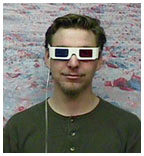
|
|
October 5, 2005: A moment with...
(Stephanie Diani/The New York Times) |
Michael E. Brown ’87
After years spent scanning the distant stretches of the sky, astronomer Michael Brown ’87 of Caltech and two other researchers announced the discovery in July of what may be the 10th planet in our solar system. Located 10 billion miles from the sun and provisionally named 2003UB313, the celestial body awaits a determination of its status by the International Astronomical Union. Brown recently spoke with PAW’s Mark F. Bernstein ’83.
What is the status of what you found?
It’s in committee limbo. One subcommittee of the IAU is trying to decide what is a planet, since no one has ever really figured that out before. Then, if they decide that 2003UB313 is a planet, another subcommittee will decide what to name it.
Do you have a preference as to what they name it?
Absolutely. It’s sort of like your baby. It would be bad if they named your baby something that you didn’t like.
What’s your preference?
Under IAU rules, we’re not allowed to say anything until they make their decision. But we think our name choice is a good one.
Why has it taken so long to discover that there may be another planet in our own solar system?
Astronomers keep asking that question, too. There are three answers. One, this is really far away — three times farther away than Pluto — so it’s a good bit fainter than any of the other planets. It’s also tilted out of the plane of the rest of the solar system, so it’s not where you would look for planets. Finally, no one has been looking for one.
Could there be even more planets in our solar system?
Over the last seven years, we’ve surveyed half the skies and found one of these possible planets. So maybe there are one or two other ones out at a similar distance. If you were to go further out, to say 300 times the distance of Pluto, I would be willing to bet that there are things the size of Mars or Mercury out in that region. But it’s going to be a long time before we find them.
It’s surprising that astronomers are still arguing over what a planet is. How do you define a planet?
It may seem funny to have to define a word that people have used for 2,000 years, but it doesn’t bother me. It’s sort of like defining the word “continent.” Everyone uses it, but if you asked a geologist what a continent is, he’d say they’re just the seven things that we call continents. Well, planets are just the nine things we call planets. If you were forced to come up with a more scientific definition, you’d probably say that planets are the large, special objects in the solar system.
So you’re saying that because Pluto is a planet, then 2003UB313 is also?
That’s essentially it. If Pluto is a planet, then so is this. If Pluto is not a planet, then this isn’t one, either. That’s also a scientifically supportable conclusion. But there’s another movement which would define a planet as anything round in orbit around the sun. I think that’s a really bad idea. It would include Pluto, but also asteroids like Ceres, which we’ve known about for 200 years, and perhaps a dozen other objects. To suddenly decide that something we’ve known about for that long is a planet too would ruin the specialness of what it means to be a planet.
I get the sense that astronomers don’t spend a lot of time with their eyes to a telescope anymore.
I hardly spend any time at all looking through a telescope. If you had to make all the observations yourself, it might take 50 years. Instead we have a robotic, computer-controlled telescope which runs every night and then downloads its data to my computer in Pasadena. I come in to work in the morning and look at a lot of 180 mega-pixel digital photographs.
Did your interest in astronomy develop at Princeton?
I’ve had an interest in astronomy as long as I can remember. I
grew up in Huntsville, Ala., where they built the Saturn rockets, and
we had astronauts who lived down the street. When I got to Princeton,
I convinced myself that I had to do something real and that astronomy
was not a real profession, so I was a physics major instead. I remember
telling Professor Jim Peebles [*62] one day that I would probably go to
graduate school to study theoretical astrophysics and he said, in an offhanded
way, “There are a lot of people who do that. There need to be more
people who go out and collect the data. Why don’t you go into astronomy?”
![]()

